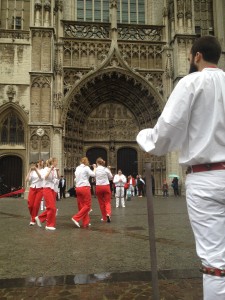Dance Researcher/Dance Advocate
While classical anthropology prescribed a role for the fieldworker that removed them from goings-on of the “objects” of their study in the name of objectivity, today it is well understood that a fieldworker will always have an impact when they enter a community. Many anthropologists have taken this to mean that the researcher must be aware of this impact as well as their own subjectivity and try to represent this to their readers. Others argue that as the creators of sanctioned, valued knowledge, the researcher has an obligation to use their privileged position to assist these communities. Scholars collaborate with practitioners in the co-creation of knowledge that can be useful for the dance, not only for the researchers.
I have been involved in sword dance research since 2011, when I conducted the largest survey of hilt-and-point sword dance in nearly a century. Through this website and my research, I am building a way for groups to understand each others dances, collaborate with other dancers, and build collective knowledge of the form. I hope to use my duel position of researcher-advocate to increase the visibility of sword dancing, strengthen collaboration between sword dance groups, and support research into the history, choreography, and anthropology of the dances. I want to encourage and assist in the formation of national and international organizations to support sword dance as intangible cultural heritage. Come back next Tuesday for the outline of my next research project on the revival of English sword dance in the UK, USA and beyond.
